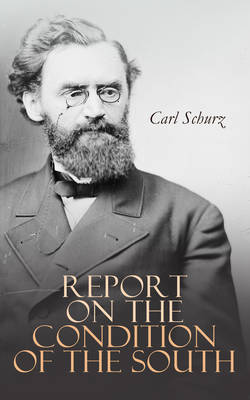Читать книгу Report on the Condition of the South - Schurz Carl - Страница 8
На сайте Литреса книга снята с продажи.
SITUATION OF UNIONISTS.
ОглавлениеIt would have been a promising indication of returning loyalty if the old, consistent, uncompromising Unionists of the south, and those northern men who during the war settled down there to contribute to the prosperity of the country with their capital and enterprise, had received that measure of consideration to which their identification with the new order of things entitled them. It would seem natural that the victory of the national cause should have given those who during the struggle had remained the firm friends of the Union, a higher standing in society and an enlarged political influence. This appears to have been the case during that "first period" of anxious uncertainty when known Unionists were looked up to as men whose protection and favor might be of high value. At least it appears to have been so in some individual instances. But the close of that "first period" changed the aspect of things.
It struck me soon after my arrival in the south that the known Unionists—I mean those who during the war had been to a certain extent identified with the national cause—were not in communion with the leading social and political circles; and the further my observations extended the clearer it became to me that their existence in the south was of a rather precarious nature. Already in Charleston my attention was called to the current talk among the people, that, when they had the control of things once more in their own hands and were no longer restrained by the presence of "Yankee" soldiers, men of Dr. Mackey's stamp would not be permitted to live there. At first I did not attach much importance to such reports; but as I proceeded through the country, I heard the same thing so frequently repeated, at so many different places, and by so many different persons, that I could no longer look upon the apprehensions expressed to me by Unionists as entirely groundless. I found the same opinion entertained by most of our military commanders. Even Governor Sharkey, in the course of a conversation I had with him in the presence of Major General Osterhaus, admitted that, if our troops were then withdrawn, the lives of northern men in Mississippi would not be safe. To show that such anticipations were not extravagant, I would refer to the letter addressed to me by General Osterhaus. (Accompanying document No. 10.) He states that he was compelled to withdraw the garrison from Attala county, Mississippi, the regiment to which that garrison belonged being mustered out, and that when the troops had been taken away, four murders occurred, two of white Union men, and two of negroes. (He informed me subsequently that the perpetrators were in custody.) He goes on to say: "There is no doubt whatever that the state of affairs would be intolerable for all Union men, all recent immigrants from the north, and all negroes, the moment the protection of the United States troops were withdrawn." General Osterhaus informed me of another murder of a Union man by a gang of lawless persons, in Jackson, about the end of June. General Slocum, in his order prohibiting the organization of the State militia in Mississippi, speaks of the "outrages committed against northern men, government couriers, and negroes." (Accompanying document No. 12.) He communicated to me an official report from Lieutenant Colonel Yorke, commanding at Port Gibson, to General Davidson, pointing in the same direction. General Canby stated to me that he was obliged to disband and prohibit certain patrol organizations in Louisiana because they indulged in the gratification of private vengeance. Lieutenant Hickney, assistant commissioner of the Freedmen's Bureau, at Shreveport, Louisiana, in a report addressed to Assistant Commissioner Conway, says: "The life of a northern man who is true to his country and the spirit and genius of its institutions, and frankly enunciates his principles, is not secure where there is not a military force to protect him." (Accompanying document No. 32.) Mr. William King, a citizen of Georgia, well known in that State, stated to me in conversation: "There are a great many bad characters in the country, who would make it for some time unsafe for known Union people and northerners who may settle down here to live in this country without the protection of the military." The affair of Scottsborough, in the military district of northern Alabama, where a sheriff arrested and attempted to bring to trial for murder Union soldiers who had served against the guerillas in that part of the country, an attempt which was frustrated only by the prompt interference of the district commander, has become generally known through the newspapers. (Accompanying document No. 19.) It is not improbable that many cases similar to those above mentioned have occurred in other parts of the south without coming to the notice of the authorities.
It is true these are mere isolated cases, for which it would be wrong to hold anybody responsible who was not connected with them; but it is also true that the apprehensions so widely spread among the Unionists and northern men were based upon the spirit exhibited by the people among whom they lived. I found a good many thinking of removing themselves and their families to the northern States, and if our troops should be soon withdrawn the exodus will probably become quite extensive unless things meanwhile change for the better.
